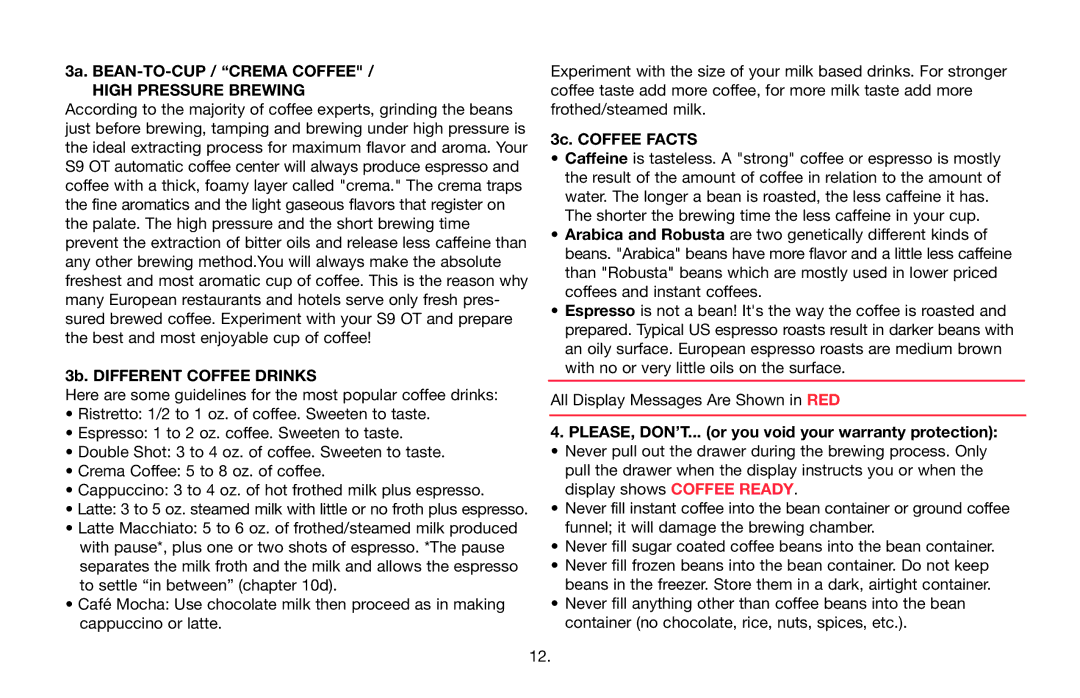3a. BEAN-TO-CUP / “CREMA COFFEE" /
HIGH PRESSURE BREWING
According to the majority of coffee experts, grinding the beans just before brewing, tamping and brewing under high pressure is the ideal extracting process for maximum flavor and aroma. Your S9 OT automatic coffee center will always produce espresso and coffee with a thick, foamy layer called "crema." The crema traps the fine aromatics and the light gaseous flavors that register on the palate. The high pressure and the short brewing time prevent the extraction of bitter oils and release less caffeine than any other brewing method.You will always make the absolute freshest and most aromatic cup of coffee. This is the reason why many European restaurants and hotels serve only fresh pres- sured brewed coffee. Experiment with your S9 OT and prepare the best and most enjoyable cup of coffee!
3b. DIFFERENT COFFEE DRINKS
Here are some guidelines for the most popular coffee drinks:
•Ristretto: 1/2 to 1 oz. of coffee. Sweeten to taste.
•Espresso: 1 to 2 oz. coffee. Sweeten to taste.
•Double Shot: 3 to 4 oz. of coffee. Sweeten to taste.
•Crema Coffee: 5 to 8 oz. of coffee.
•Cappuccino: 3 to 4 oz. of hot frothed milk plus espresso.
•Latte: 3 to 5 oz. steamed milk with little or no froth plus espresso.
•Latte Macchiato: 5 to 6 oz. of frothed/steamed milk produced with pause*, plus one or two shots of espresso. *The pause separates the milk froth and the milk and allows the espresso to settle “in between” (chapter 10d).
•Café Mocha: Use chocolate milk then proceed as in making cappuccino or latte.
Experiment with the size of your milk based drinks. For stronger coffee taste add more coffee, for more milk taste add more frothed/steamed milk.
3c. COFFEE FACTS
•Caffeine is tasteless. A "strong" coffee or espresso is mostly the result of the amount of coffee in relation to the amount of water. The longer a bean is roasted, the less caffeine it has.
The shorter the brewing time the less caffeine in your cup.
•Arabica and Robusta are two genetically different kinds of beans. "Arabica" beans have more flavor and a little less caffeine than "Robusta" beans which are mostly used in lower priced coffees and instant coffees.
•Espresso is not a bean! It's the way the coffee is roasted and prepared. Typical US espresso roasts result in darker beans with an oily surface. European espresso roasts are medium brown with no or very little oils on the surface.
All Display Messages Are Shown in RED
4.PLEASE, DON’T... (or you void your warranty protection):
• Never pull out the drawer during the brewing process. Only pull the drawer when the display instructs you or when the display shows COFFEE READY.
• Never fill instant coffee into the bean container or ground coffee funnel; it will damage the brewing chamber.
• Never fill sugar coated coffee beans into the bean container.
• Never fill frozen beans into the bean container. Do not keep beans in the freezer. Store them in a dark, airtight container.
• Never fill anything other than coffee beans into the bean container (no chocolate, rice, nuts, spices, etc.).
12.
